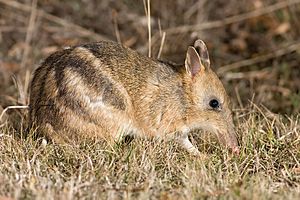Peramelidae facts for kids
Quick facts for kids Peramelidae |
|
|---|---|
 |
|
| An eastern barred bandicoot | |
| Scientific classification |
|
| Kingdom: | Animalia |
| Phylum: | Chordata |
| Class: | Mammalia |
| Infraclass: | Marsupialia |
| Order: | Peramelemorphia |
| Family: | Peramelidae Gray, 1825 |
| Subfamilies and genera | |
|
Peramelinae
Peroryctinae
Echymiperinae
|
|
Bandicoots are small marsupials that belong to a family called Peramelidae. These amazing animals live all over Australia and New Guinea. You can find them in many different places, from thick rainforests to dry deserts.
Scientists have found four types of fossil bandicoots. One extinct bandicoot, the pig-footed bandicoot, was so unique that it now has its own special family.
What Are Bandicoots Like?
Bandicoots are small, furry marsupials. Their size can vary a lot! The smallest, like the mouse bandicoot, are only about 15-17.5 centimeters (6-7 inches) long. The biggest, like the giant bandicoot, can be 39–56 centimeters (15-22 inches) long and weigh up to 4.7 kilograms (10 pounds). That's about the size of a rabbit!
They have short legs and tails. Their ears are small and look a bit like a mouse's. Bandicoots also have a long, pointy nose, which helps them find food.
Bandicoots are omnivores. This means they eat both plants and animals. They mostly dig for small creatures that live in the soil, like worms and insects. They also enjoy eating seeds, fruits, and even mushrooms. Their teeth are not specialized for just one type of food, which is perfect for their varied diet.
Bandicoot Reproduction
Female bandicoots have a special pouch where their babies grow. This pouch opens towards their rear. Inside the pouch, there are eight teats, which are like tiny milk spouts for the babies.
A female bandicoot can have up to eight babies at once. However, it's more common for them to have two to four young in a litter. Bandicoots have the shortest gestation period (pregnancy) of any mammal, lasting only about 12.5 days!
Their babies are very tiny when they are born. They stay attached to a teat inside the mother's pouch as they grow. The young bandicoots are ready to stop drinking milk around two months old. They become adults and can have their own babies when they are just three months old. This fast growth means female bandicoots can have many litters in one breeding season. This makes bandicoots very good at having lots of babies compared to other marsupials.
Bandicoot Families
Scientists group bandicoots into different families and subfamilies. Here are some of the main groups:
- Family Peramelidae
- Subfamily Peramelinae
- Genus Crash† (This is a fossil group!)
- Crash bandicoot† (a fossil species)
- Genus Isoodon: These are called short-nosed bandicoots.
- Genus Perameles: These are the long-nosed bandicoots.
- Genus Crash† (This is a fossil group!)
- Subfamily Peroryctinae
- Genus Peroryctes: These are New Guinean long-nosed bandicoots.
- Giant bandicoot
- Raffray's bandicoot
- Genus Peroryctes: These are New Guinean long-nosed bandicoots.
- Subfamily Echymiperinae
- Genus Echymipera: These are New Guinean spiny bandicoots.
- Long-nosed spiny bandicoot
- Common spiny bandicoot
- Genus Microperoryctes: These are New Guinean mouse bandicoots.
- Mouse bandicoot
- Eastern striped bandicoot
- Western striped bandicoot
- Genus Rhynchomeles
- Genus Echymipera: These are New Guinean spiny bandicoots.
- Subfamily Peramelinae
Groves, Colin (16 November 2005). Wilson, D. E., and Reeder, D. M. (eds). ed. Mammal Species of the World (3rd edition ed.). Johns Hopkins University Press. pp. 39–42. ISBN 0-801-88221-4. http://www.bucknell.edu/msw3.
See also
 In Spanish: Bandicuts para niños
In Spanish: Bandicuts para niños
 | Sharif Bey |
 | Hale Woodruff |
 | Richmond Barthé |
 | Purvis Young |

